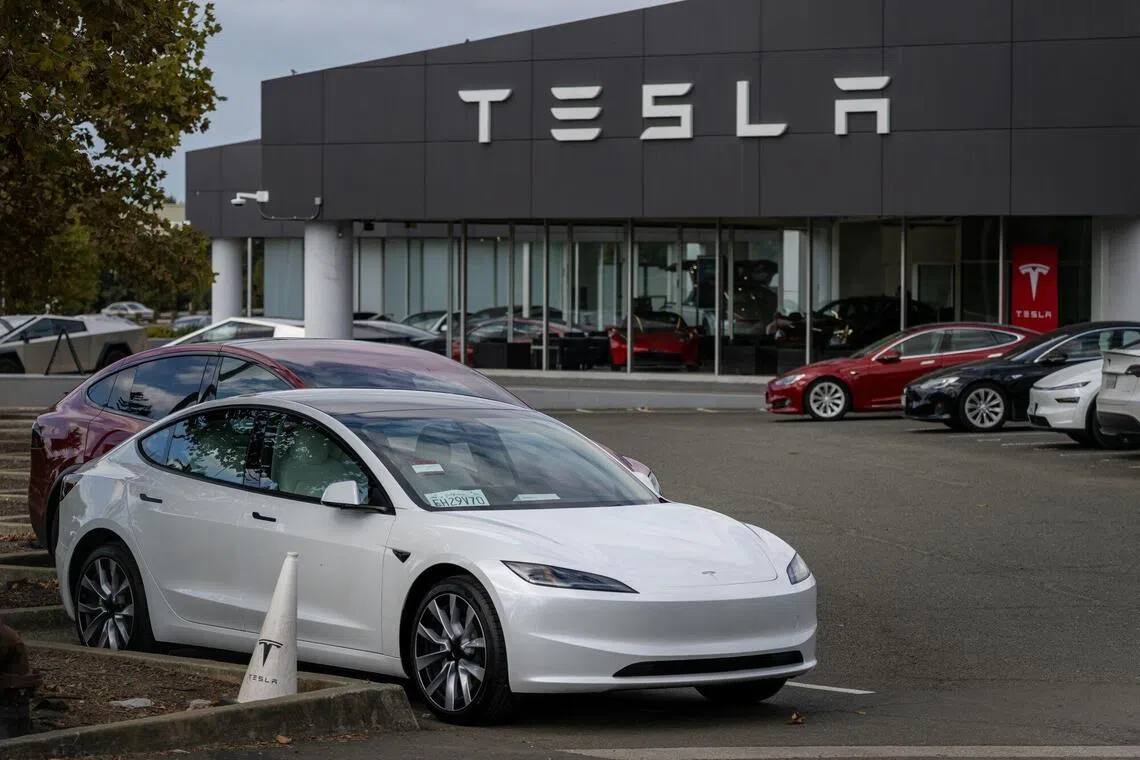Tesla’s profit tumbles despite record sales, hit by higher costs and fading tax credits
Sign up now: Get ST's newsletters delivered to your inbox

Tesla's operating expenses soared 50 per cent to US$3.4 billion in the quarter.
PHOTO: BLOOMBERG
Follow topic:
TEXAS – Tesla’s profit plunged more than expected, as sharply rising costs undercut the highest quarterly sales of its electric vehicles (EVs) as US buyers rushed to lock in a key tax credit ahead of its expiry.
Profit fell 37 per cent to US$1.4 billion (S$1.8 billion) from a year earlier, below analysts’ forecast, even as revenue rose 12 per cent to US$28.1 billion.
The results show that the EV manufacturer is not immune to the rising costs that have buffeted the nation’s auto industry all year as President Donald Trump radically overhauls policy.
Tesla’s operating expenses soared 50 per cent to US$3.4 billion in the quarter, driven by artificial intelligence (AI) and other research and development projects. In an earnings conference call on Oct 22, chief financial officer Vaibhav Taneja said capital expenditures would rise substantially in 2026.
Tesla expects about US$400 million of impact from US tariffs.
Chief executive officer Elon Musk is promising a future built around AI, humanoid robots and self-driving technology – points he underlined in Tesla’s conference call with investors. Investors have largely bought into his vision, driving the shares up 8.7 per cent so far in 2025 through their close in regular trading on Oct 22.
But the shares dropped 4.1 per cent in extended trading after the results’ announcement and Tesla’s conference call, signalling investors’ disappointment that the company offered only limited details on its outlook.
“The market’s realising Tesla trades like an AI platform but reports like a carmaker,” said Karobaar Capital chief investment officer Haris Khurshid. Mr Dec Mullarkey, a managing director at SLC Management, said “there is not much here to inspire investors”.
Tesla reiterated language from the previous quarter that it is “difficult to measure” how shifting global trade and fiscal policies would impact its businesses and operations.
It sees results hinging on the broader economic environment as well as its speed in accelerating autonomy efforts and ramping up production for key products.
Analysts surveyed by Bloomberg expect Tesla to report a second year in a row of declining vehicle deliveries.
Earlier in October, Tesla reported record third-quarter sales as customers rushed to take advantage of a US$7,500 US tax credit for EV purchases that expired on Sept 30, delivering a temporary boost to its core automotive business.
On Oct 22, Tesla reported US$417 million in revenue from regulatory credits it receives from other automakers that exceed emissions standards – only slightly below the previous quarter’s amount. Policy changes under the Trump administration have reduced demand for the credits. Tesla has said it anticipated a decline in that business.
Mr Musk expects Tesla’s robotaxi business, which launched in Austin in June, to expand to as many as 10 metropolitan areas by the end of the year if it receives approvals.
He also said the company would remove most human safety operators from robotaxis in Austin later in 2025.
It is not clear how many of the vehicles are operating there after the EV maker launched with about 10 to 20. BLOOMBERG

